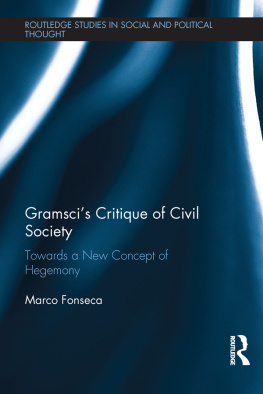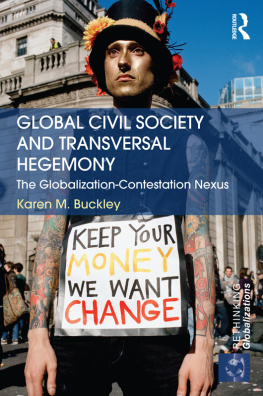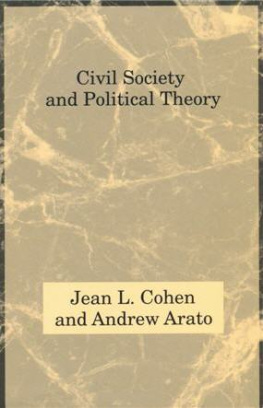Marco Fonseca - Gramscis Critique of Civil Society: Towards a New Concept of Hegemony
Here you can read online Marco Fonseca - Gramscis Critique of Civil Society: Towards a New Concept of Hegemony full text of the book (entire story) in english for free. Download pdf and epub, get meaning, cover and reviews about this ebook. year: 2016, publisher: Routledge, genre: Politics. Description of the work, (preface) as well as reviews are available. Best literature library LitArk.com created for fans of good reading and offers a wide selection of genres:
Romance novel
Science fiction
Adventure
Detective
Science
History
Home and family
Prose
Art
Politics
Computer
Non-fiction
Religion
Business
Children
Humor
Choose a favorite category and find really read worthwhile books. Enjoy immersion in the world of imagination, feel the emotions of the characters or learn something new for yourself, make an fascinating discovery.
- Book:Gramscis Critique of Civil Society: Towards a New Concept of Hegemony
- Author:
- Publisher:Routledge
- Genre:
- Year:2016
- Rating:5 / 5
- Favourites:Add to favourites
- Your mark:
- 100
- 1
- 2
- 3
- 4
- 5
Gramscis Critique of Civil Society: Towards a New Concept of Hegemony: summary, description and annotation
We offer to read an annotation, description, summary or preface (depends on what the author of the book "Gramscis Critique of Civil Society: Towards a New Concept of Hegemony" wrote himself). If you haven't found the necessary information about the book — write in the comments, we will try to find it.
Marco Fonseca: author's other books
Who wrote Gramscis Critique of Civil Society: Towards a New Concept of Hegemony? Find out the surname, the name of the author of the book and a list of all author's works by series.
Gramscis Critique of Civil Society: Towards a New Concept of Hegemony — read online for free the complete book (whole text) full work
Below is the text of the book, divided by pages. System saving the place of the last page read, allows you to conveniently read the book "Gramscis Critique of Civil Society: Towards a New Concept of Hegemony" online for free, without having to search again every time where you left off. Put a bookmark, and you can go to the page where you finished reading at any time.
Font size:
Interval:
Bookmark:
| 99 | Phenomenology of Youth Cultures and Globalization |
| Lifeworlds and Surplus | |
| Meaning in Changing Times | |
| Edited by Stuart R. Poyntz and Jacqueline Kennelly | |
| 100 | Hannah Arendt and the Limits Of Total Domination |
| The Holocaust, Plurality, and Resistance | |
| Michal Aharony | |
| 101 | The History of Compulsory Voting in Europe |
| Democracys Duty? | |
| Anthoula Malkopoulou | |
| 102 | The New Materialism |
| Althusser, Badiou, and iek | |
| Geoff Pfeifer | |
| 103 | Authenticity, Autonomy and Multiculturalism |
| Geoffrey Brahm Levey | |
| 104 | Marxism, Religion and Ideology |
| Themes from David McLellan | |
| Edited by David Bates, Iain MacKenzie and Sean Sayers | |
| 105 | Distributive Justice Debates in Political and Social Thought |
| Perspectives on Finding a Fair Share | |
| Edited by Camilla Boisen and Matthew C. Murray | |
| 106 | Re-Grounding Cosmopolitanism |
| Towards a Post-Foundational Cosmopolitanism | |
| Edited by Tamara Caraus and Elena Paris | |
| 107 | Panarchy |
| Political Theories of Non-Territorial States | |
| Edited by Aviezer Tucker and Gian Piero de Bellis | |
| 108 | Gramscis Critique of Civil Society |
| Towards a New Concept of Hegemony | |
| Marco Fonseca | |
| 109 | Deconstructing Happiness |
| Critical Sociology and the Good Life | |
| Jordan McKenzie |

by Routledge
711 Third Avenue, New York, NY 10017
2 Park Square, Milton Park, Abingdon, Oxon OX14 4RN
Names: Fonseca, Marco, author.
Title: Gramsci's critique of civil society : towards a new concept of
hegemony / Marco Fonseca.
Description: New York : Routledge, 2016. | Series: Routledge studies
in social and political thought ; 108
Identifiers: LCCN 2015038611| ISBN 9781138185876 (hbk) |
ISBN 9781315644196 (ebk)
Subjects: LCSH: Gramsci, Antonio, 18911937. | Gramsci, Antonio,
18911937. Quaderni del carcere. | HegemonyPhilosophy. | Civil
societyPhilosophy.
Classification: LCC HX289.7.G73 F65 2016 | DDC 300.1dc23
LC record available at http://lccn.loc.gov/2015038611
ISBN: 978-1-315-64419-6 (ebk)
by Wearset Ltd, Boldon, Tyne and Wear
Font size:
Interval:
Bookmark:
Similar books «Gramscis Critique of Civil Society: Towards a New Concept of Hegemony»
Look at similar books to Gramscis Critique of Civil Society: Towards a New Concept of Hegemony. We have selected literature similar in name and meaning in the hope of providing readers with more options to find new, interesting, not yet read works.
Discussion, reviews of the book Gramscis Critique of Civil Society: Towards a New Concept of Hegemony and just readers' own opinions. Leave your comments, write what you think about the work, its meaning or the main characters. Specify what exactly you liked and what you didn't like, and why you think so.











